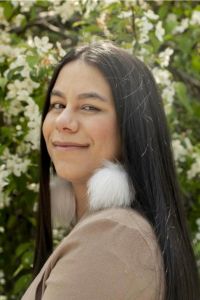
Kyrstin Dumont
Women of Inspiration
Kyrstin Dumont is an Algonquin Anishinaabe kwe and proud member of the Kitigan Zibi Anishinabeg First Nation. A nationally recognized advocate, educator, and community leader, Kyrstin has devoted her life to advancing justice, healing, and opportunity for Indigenous youth and communities across Turtle Island.
She has received several prestigious honours for her work, including CBC’s Trailblazer Award, the RBC Spirit of the Capital Award, and the inaugural DreamKEEPERS June Girvan Youth-in-Service Award for embodying the spirit of Dr. Martin Luther King Jr. through service and leadership.
From a young age, Kyrstin has been described as a Knowledge Keeper—someone who shares teachings and lived experiences with honesty, compassion, and power. Her influence has reached across classrooms, institutions, and national forums. She has worked with the Ottawa-Carleton District School Board, the Ottawa Catholic School Board, The Children’s Hospital of Eastern Ontario (CHEO), the National Arts Centre, and various churches and non-profit organizations to amplify Indigenous voices and perspectives. She serves on CHEO’s Indigenous Advisory Circle and both school boards’ Indigenous Education Councils.
Kyrstin has delivered keynote addresses on climate justice, human rights, youth engagement, and reconciliation. Her advocacy includes speaking before the House of Commons on the ongoing genocide of missing and murdered Indigenous women, girls, and two-spirit people in Canada. She has walked in ceremony to protect the water and contributed to curriculum consultations, policy development, and youth-focused initiatives with UNICEF Canada, the Child Welfare League, Children First Canada, the Medical Council of Canada, and others.
A dynamic leader in both activism and the arts, Kyrstin created “Community Unity,” a fashion, music, and arts event showcasing Indigenous designers, models, and creators in inclusive spaces where they have historically been excluded. Through this and other projects, she uplifts the voices of Indigenous youth and makes space for others to thrive.
Her academic journey—like her activism—has been grounded in resilience. As someone who navigated and challenged colonial education systems, Kyrstin is a powerful role model for Indigenous students and youth who have felt marginalized or unseen. She continues to share her knowledge through public speaking, consulting, and mentorship, bridging generations and communities with generosity and wisdom.
Kyrstin’s work is rooted in the teachings of her ancestors and in the strength of her community. She often says that Indigenous youth can and will thrive, even in systems not built for them so long as they are given safe spaces to show up fully. In every role she takes on, Kyrstin Dumont reminds us that reconciliation requires action, truth-telling, and shared responsibility and that we are all connected through this work.





